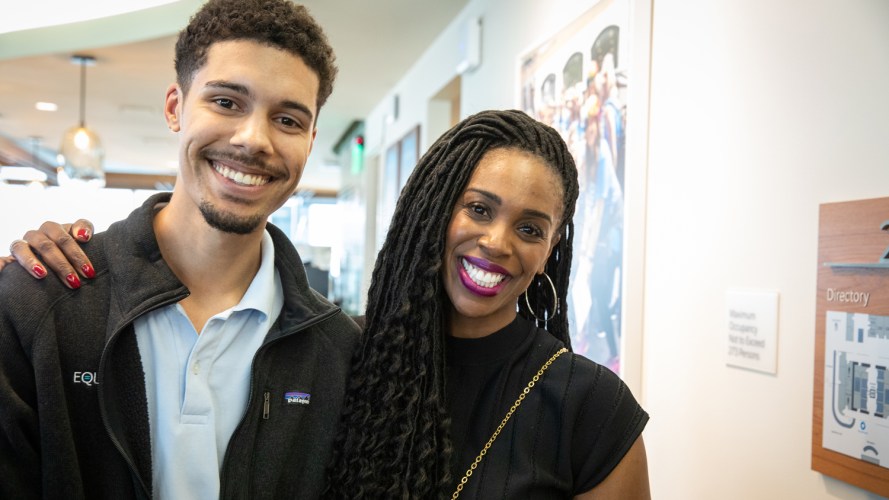Creating a workplace that reflects a society where everyone feels seen, heard, valued, and empowered to succeed is important, now more than ever. Around the globe, people are crying out for action around racial equality and justice in response to the most recent incidents of violence and hate against the Black community. This is happening all while we experience a global pandemic and economic crisis that disproportionately affects communities of color.
As business leaders, investing in communities of color at work is a crucial step in creating equality in the workplace — from diversifying your candidate pool, to creating systemic change within your company, and supporting your employees of color through inclusive programs like mentorship.
At Salesforce, equality is a core value, and in that spirit, we created an Equality Mentorship program focused on supporting employees of color through widening access to networks and wisdom sharing. This initiative was first created by BOLDforce, Salesforce’s employee resource group (ERG) for the Black community and their allies, and later adopted by Asiapacforce, the ERG for the Asian Pacific community and allies, to help increase access to senior leadership and support career growth for these groups.
As the equality mentorship lead, I merge my passions for representation, inclusion, and broadening access to opportunities in the tech industry. Starting off my career at Year Up, a workforce development organization, taught me firsthand the importance of paying it forward and lifting others as we rise, especially for our most underrepresented communities at work. As you’ll see below, it’s crucial to recognize every community faces unique historical and systemic challenges that are important to acknowledge and address.
Understanding employees of color’s experience at work
A Center for Talent Innovation report found Black professionals are more likely than their white counterparts to say they have to work harder to advance — 65% compared to 16%. When it comes to Black women, 46% feel their ideas are not heard or recognized. They are also less likely than straight white men to have their ideas endorsed.
Women of color are more likely than white women to feel they can’t be themselves if they want to be leaders. Seventy-two percent of Black women and 53% of Latinas say “executive presence” at their company means to conform to traditionally “white male standards.” In contrast, only 44% of white women felt that way. Being Black in Corporate America report found that Black professionals have less direct access to senior leaders in their company than their white counterparts, 31% compared to 44%.
Similarly, the Illusion of Asian Success report found that despite high representation in the workforce, Asian American women are also least likely to become executives of all groups divided by race and gender, largely pointing to lack of access and career development opportunities.
This is why mentorship is essential for communities of color — having access to career growth opportunities makes a huge difference in individual lives as well as company culture.
Why is mentorship important for people of color in the workplace?
Mentorship provides access to those who might not otherwise have it. It can be as simple as inviting a mentee to a meeting they would have not been able to attend, or offering a stretch assignment they’re ready to take on and demonstrate new skills.
Mentorship builds up a network and opens doors to new relationships that can influence a career trajectory. This relationship helps navigate the workplace and influence important career moments like promotions. Most importantly, it provides a support system and coaching outside of a direct manager and is invaluable. Mentorship is a two-way street and does not only benefit the mentee, but also the mentor by helping them better understand the experiences of employees and adds to their leadership experience.

How to create a mentorship program
Now that we understand the need and benefits of mentorship, let’s look at how we can cultivate a culture of mentorship for communities of color.
1. Start by listening
The first thing we recommend on your journey is an essential step: listening. You’ll never know what your employees and colleagues genuinely need until you ask and listen to their answers. We went on a listening tour when developing our mentorship program, and it built the foundation we needed to create a culture of mentorship.
2. Partner with your employee resource groups
We recommend leveraging the ERG’s, or Equality Groups as we call them, at your organization to get a program off the ground. The leaders and members of these groups will have a better understanding of what’s needed and who can use it the most. They can also serve as the vehicle to deliver this programming. BOLDforce and Asiapacforce envisioned a structured mentorship program that connects the leaders of today with the leaders of tomorrow. When you tap into the experiences of these community members you’ll be able to craft a program to suit everyone’s needs.
3. Take your participants on a developmental journey with curated content
We created a formal mentorship program that focuses on employees and interns of color. This program does not take away from any other formal or informal mentorship programs. However, it provides additional resources where they’re needed most. We deliver hyper-relevant content and resources, structuring the program around high-level themes each month to stay on track. These themes include modules around exploring growth areas, career development, giving and receiving feedback, and expanding your network just to name a few. These important modules equip our participants with the tools and guidance necessary to become the leaders of tomorrow.
Together, we can reach equality in the workplace and build an industry that truly reflects society around us. Learn more about our commitment to equality: Salesforce.com/Equality.




























